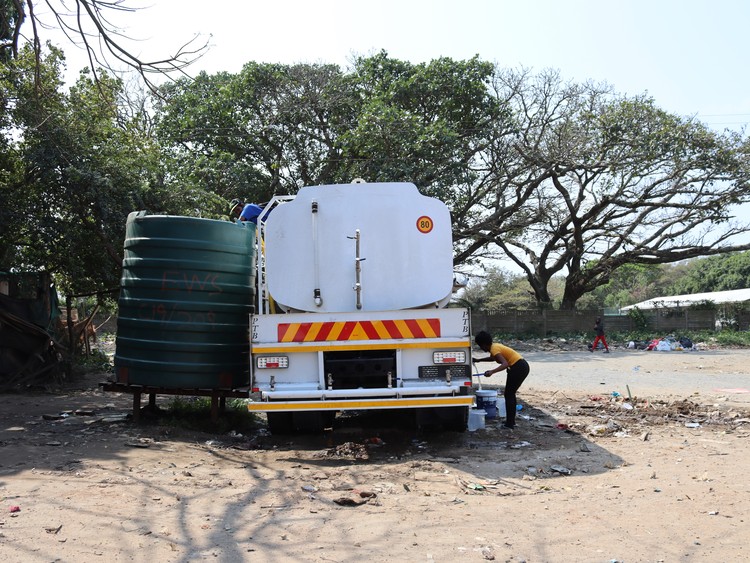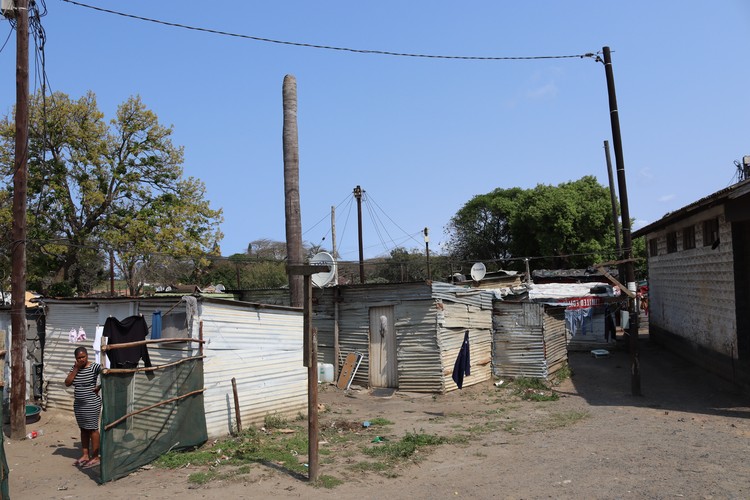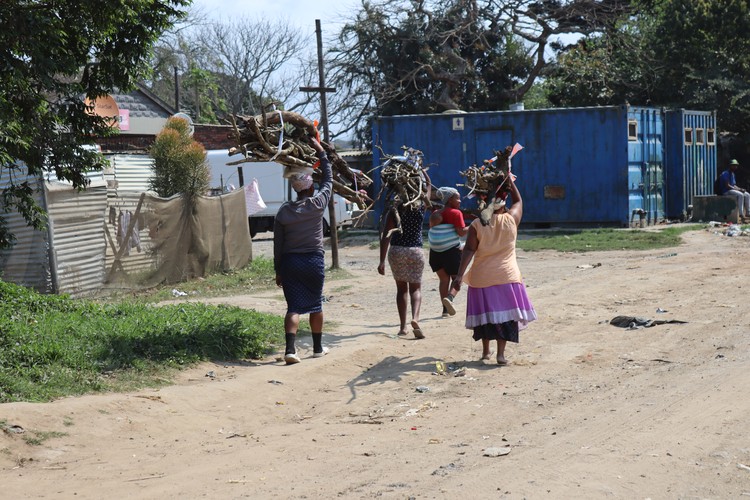Taps have been dry for years in Frazer informal settlement
EThekwini Municipality says projects are underway to build proper water infrastructure
Families in Frazer informal settlement in oThangathi have to rely on water trucks because there is no running water. Photos: Manqulo Nyakombi
- Taps in Frazer informal settlement in oThongathi, north of Durban, have been dry for years, residents say.
- They want the eThekwini Municipality to give them running water and electrify their shacks.
- According to community leaders, Frazer has more than 1,500 shacks. Most rely on water tankers.
- The municipality says there are projects underway to build proper infrastructure in Frazer.
“We really loved the ANC but now we see they do not love us,” says Nonelwa Mashozi, who has lived in Frazer informal settlement in oThongathi for more than 20 years.
Last week, Mashozi joined scores of her neighbours who blocked the busy R102 highway between Stanger and oThongathi. They are demanding that the eThekwini Municipality provide them with running water and electrify their shacks.
Mashozi told GroundUp that she and many others had decided not to vote for the ANC in the elections next year. “To prove that we were loyal to the ANC, other political parties were not welcomed here. But now we are calling them because our ANC has failed us,” she said. Mashozi lives in a one-room shack with her husband and their three children. The shack is made of planks with holes in the wall.
According to community leaders, Frazer has more than 1,500 shacks. Most people living there rely on water tankers because taps in the area have been dry for years. They rely on illegal connections for electricity.
Ward committee chairperson Vuyisa Yalo said electricity had been installed in some shacks in 2016, but the project was never completed. He said Eskom had promised to return but never did.
Yalo said the informal settlement had three transformers but all had burned down, the most recent one in September last year.
“We have been in and out of Eskom’s offices in Stanger asking for assistance with no luck. At first they said we will pay for the new transformer, then changed to say that those with meter boxes must buy electricity for R350 before Eskom comes back. People did that but Eskom did not come,” said Yalo.
Some of the overhead illegal electricity cables in Frazer informal settlement.
Resident Mpipi Khathula said, “For years we have been asking for electricity, then when they finally listened, they only selected a few houses and left others without electricity. We had no choice but to use an illegal connection. Now they are blaming us for burning the transformers.”
Khathula said the communal toilets in the community were blocked and needed repairs. GroundUp was shown 16 locked toilets that are meant to be shared by about 100 families. He said most people did not use the toilets because they were too far from the houses.
“They use the bushes and it’s not safe. The only thing our officials are good at is giving us empty promises. After elections they disappear,” he said.
Gugu Sisilana, spokesperson for eThekwini Municipality, said Frazer informal settlement fell under Eskom’s supply area. But when we contacted Eskom, staff in the media office told GroundUp that the electricity supply to this community was the municipality’s responsibility. Neither Eskom nor Sisilana have responded to our questions asking for clarity on this. According to residents, they met with an official from Eskom last week about their complaints.
On the water issue, Sisilana said Frazer currently does not have formal water infrastructure. The City was working on long-term projects such as the construction of a reservoir and a water reticulation plant, which should improve the water supply.
Sisilana said they expect these projects to be completed by mid-October.
Women walk to collect wood to cook because there is no formal electricity in the community.
Next: Latest census results to be announced 10 October
Previous: As bad as living in shacks, say flooded Qunu’s RDP residents
© 2023 GroundUp. This article is licensed under a Creative Commons Attribution-NoDerivatives 4.0 International License.
You may republish this article, so long as you credit the authors and GroundUp, and do not change the text. Please include a link back to the original article.
We put an invisible pixel in the article so that we can count traffic to republishers. All analytics tools are solely on our servers. We do not give our logs to any third party. Logs are deleted after two weeks. We do not use any IP address identifying information except to count regional traffic. We are solely interested in counting hits, not tracking users. If you republish, please do not delete the invisible pixel.





